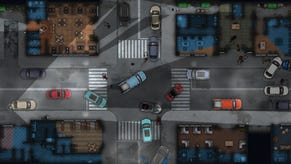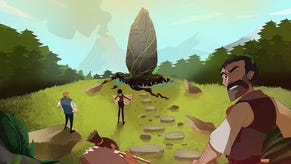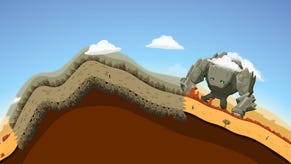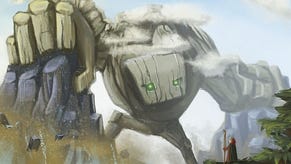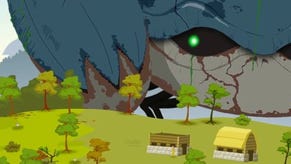Impressions: Reus
Flat Earth sim
God game! God game! GOD GAME! It's been too long. We've been so hungry. Now Abbey Games' Reus is almost here, being all godly, being all gorgeous and being all oddball too. I've been playing preview code for Abbey Games' forthcoming world-fiddler (which comes out in just over a week), and thought I'd share a few initial thoughts ahead of a full review once the game's out.
Reus really is exceptionally pretty. So crisp, too - I'm running a 2560x1440 monitor, and it and the game look like they were made for each other. If only all 2D games scaled like this, I'd be happy to never see a polygon again in my life. The world is presented side-on, in cross section, like a boiled egg sliced in half. A boiled egg with a hot, steaming core and a quartet of continent-sized gods roaming its exterior.
These gods, with representing ocean, forest, swamp and mountain, are the stars of the show, both in terms of how unceasingly they draw the eye and because they're absolutely bound in with the terraforming and life-seeding.
They're not an odd bolt-on like Black & White's Creatures: they are the strategy here. Stomping glacially but indefatigably around the planet's circumference, they summon seas and trees, flora and fauna, minerals and mountains with a sort of world-weary, unhurried surety. You can switch to any god at any time, which leaves the other three sat around like grumpy Everests. Time is nothing to them. They're gods.
You, well, I don't know what you are. Some sort of meta-god, maybe. You can spin the planet around, you can zoom in and out to admire its enormity or watch chickens stumbling around and little folk gathering food, and most of all you can tell those sleepy gods what needs doing. The central mechanic is having them seed the planet, which is divided into equally-sized segments, with animal, vegetable or mineral resources. The smallest amount will quickly result in the creation of a settlement, and with it human inhabitants.
Actually, rewind a little - before you can usually plant anything, you need to do a spot of basic terraforming, transforming around 10% of the planet's surface into ocean, forest, swamp or desert, each of which will grow different species of plant and animal, which in turn have different effects on what else can be generated. The terraforming aspect is pretty brief and uninvolved in what I've seen so far, though there seems a subtle layer of strategy in terms of unlocking more advanced powers for your gods.
So, forwardwind back to where we were. You've got a village, you've got humans, you've got some basic food, wealth and tech being generated by the plants, minerals and animals placed nearby. Now the real game begins. And, well, it's kind of mathsy. Each food, tech or wealth source is capable of 'symbiosis' with another resource, activated if it's suitably proximate. Symbiosis means a bonus to resource generation. Goddit.
On top of that, your gods can cast spells on most resources, which will increase their output. OK. Some spells and some symbioses allow resources to transform into other types of resource (e.g. elderberries into strawberries into tomatoes, chicken into rabbits, frogs into stoats), which can generate more or different stuff. Um. Once that transformation has happened, the resource becomes capable of a different symbiosis. Er. And the gods can cast their spells on them again. Ah. And so it continues.
In theory, you're gradually escalating the amount of food, wealth and tech you're bringing into your village; in practice you're playing a sort of planet-wide inventory Tetris, shuffling tomatoes to here or chickens to there in order to try and sustain and maximise the bonuses. To be honest, I found that the effects of this stuff were predominantly numerical rather than seeming to meaningfully or even particularly visibility affect the world. These amazing-looking, humongous deities, but what they're mostly doing is implementing stat multipliers. It does seem something of a waste. Perhaps it'll seem more meaningful and exciting once I have a fuller-grasp of the ultimate pay-offs of each resource, though. And once I start throwing rock-bombs at chickens for no good reason.
That's the other thing. I wasn't entirely sure why I was doing all this. Sure, watching the slow evolution of the landscape was its own reward to some degree, though again the visual changes aren't particularly grand once you're past the initial terraforming and village-founding. Beyond that, the game pops up micro-challenges to help villages build special structures such as schools and granaries, each of which requires a certain amount of certain resources. So that's all your stat multiplication is essentially in aid of. Once a village completes a structure, it spawns an ambassador, who'll cutely go and sit on one god's shoulder and grants them a new ability. A stat-multiplication ability, naturally. Different types of land - forest, swamp, desert - will eventually generate different types of ambassadors, which in turn mean new abilities.
There's a certain gotta catch 'em all ethos here, though you also need to combine them all without running out of space. It all looks so lovely, but I felt like most of the time I was just fiddling with tiny things rather than being a big old god-guy doing big, exciting things. I need to spend much more time with it though, and see how impressive things look once I've got far bigger animals, far fleshier fruit and greedier, more belligerent people living on my bifurcated world.
Of the latter I've had minimal experience to date, but after a time a village may decide it wants more of something, and it's going to try and snatch it from somewhere else. With a certain relief, I turned to the little-used buttons on the far right of my giants' toolbars. Smash! Smother! Drown! DESTROY. And so it was that these insects who had consumed so much of my time with their petty, pointless demands for more were eradicated. That felt like a reward.
More on Reus soon: I must spend more time with it before coming to any judgement. It really does look magnificent, and the sheer, awesome presence of the gods is such a treat, but I worry that its bread and butter mechanics might feel more a chore than celebratory omnipotence. We'll see what later escalations bring, though. For now, I'm oddly happy to just sit there in freeplay mode, spinning the vast globe around as my giants grumpily haul their impossible bulk around the perfectly circular planetary crust. It'd be my ideal screensaver, I think.
Reus should be out on the 16th, and hopefully we'll have a Wot I Think then too.









